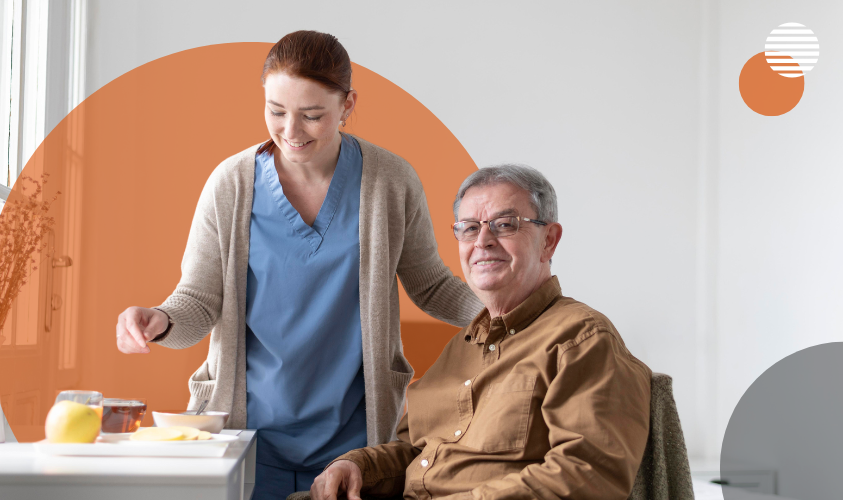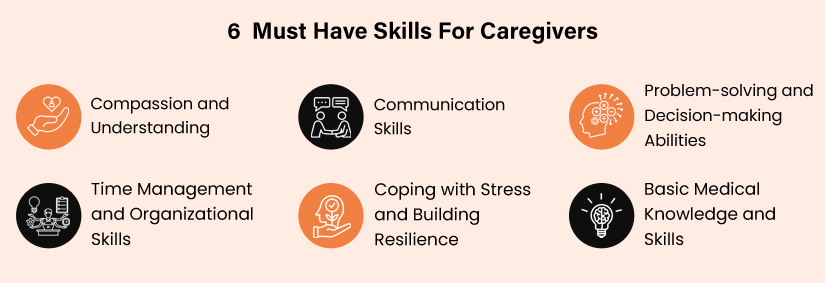
The path of caregiving for seniors is a journey filled with trials and errors, calling upon diverse skills to meet the unique needs of those under your care. This role extends beyond fulfilling physical tasks; it entails providing a comforting presence, a listening ear, and sometimes even financial guidance to individuals who cannot fully care for themselves due to illness, disability, or advancing age.
To truly excel in caring for the elderly, one must possess various skill sets, allowing them to connect profoundly with those they are caring for.
So, come along as we dive into the essential skills your caregivers must possess.
A caregiver provides different kinds of help – physical and emotional – to a person who can’t do everything for themselves. This could be because the person is sick, has a disability, or is getting older. Caregivers can be professionals, like nurses or helpers who come to your home, or regular people, like family or friends.
Their job involves many things, from helping with everyday tasks like bathing, eating, and taking medicine to provide emotional support and keeping company. Most importantly, being a caregiver is about making the person they’re caring for feel better and improving their life however they can.

Being a caregiver involves more than just physical tasks; it also involves offering emotional support. It’s important to realize that clients might feel scared, sad, or uncertain because they rely on others for help.
Caregivers can make a big difference by showing kindness and understanding. This helps the person feel better emotionally and can improve their overall well-being.
Here’s How to Improve Compassion and Understanding:
To become more compassionate and understanding, listen to what the person you’re caring for has to say. Acknowledge their feelings, and respond with care and empathy.
Try to imagine how they might feel, and be patient with them. Showing the caregiver genuinely cares about their well-being can make a difference.
By being compassionate and understanding, caregivers create a safe and supportive environment where the person they’re caring for feels valued and respected. This makes caregiving for seniors easier and enriches the bond between caregivers and the elderly.
In elderly caregiving, how the caregiver talks and listens can affect how they connect with the person they are caring for. Let’s explore important ways to improve communication and show that the caregiver truly cares.
Why is it important to pay attention to both?
Conversations between caregivers and their patients are more than words. Certainly, speaking clearly is important, but it’s also about how they say things and how they act. For example, a warm smile or a gentle touch can speak volumes and show that we’re there to help.
As caregivers, we should be open, honest, and positive when we talk. This means using a kind tone of voice and showing with our body language that we care about the person we’re talking to.
Listening carefully is really important when we’re caring for someone. It’s not just about hearing the words; it’s about understanding what the person is saying and showing them that we’re truly there for them.
When caregivers listen carefully, they help build trust and show the person they care about their feelings and concerns. It also helps the seniors understand their needs so the caregiver can provide the best care. Paying attention to how the caregiver talks and listens can create a supportive and caring environment where the person you’re caring for feels valued and understood.
Caregivers often find themselves in situations where they must make quick decisions and solve problems immediately. That’s why developing problem-solving and decision-making skills is essential for managing these challenges effectively.
Here’s How To Improve These Skills –
Developing these skills involves thinking critically, staying calm under pressure, and being willing to seek advice when needed. By approaching problems with a clear mind and a compassionate heart, caregivers can find solutions that best meet the needs of those they care for.
Caregivers have a lot on their plate, from managing medications to keeping track of appointments and household chores. Good time management and organizational skills are key to ensuring that everything gets done efficiently without sacrificing the quality of care.
Here’s How to Enhance These Skills –
Effective time management involves prioritizing tasks, setting realistic goals, and creating schedules that allow for flexibility. Caregivers can also benefit from implementing organizational strategies, such as using calendars or to-do lists, to keep track of important dates and responsibilities.
By mastering these skills, caregivers can manage their duties with ease and efficiency, allowing them to provide the best possible care while also taking care of themselves.
Caregiving can be tough, both physically and emotionally. Caregivers often find themselves under a lot of stress, which can affect their mental health if not managed properly. Building resilience and finding healthy ways to cope with stress is crucial for maintaining well-being.
Here’s How to Cultivate Stress Management and Resilience –
Taking care of yourself is key. This can include practicing self-care activities like exercise, relaxation techniques, and hobbies that bring the caregiver joy. It’s also important to reach out for support from friends, family, or support groups. Maintaining a positive outlook and finding meaning in your role as a caregiver can also help build resilience and keep stress in check.
As a caregiver, a basic understanding of the medical conditions you’re dealing with is essential for effective care. This includes knowing how to manage symptoms, administer medications safely, and respond to emergencies.
Here’s how to Acquire Medical Knowledge and Skills –
Educating yourself about the patient’s medical condition, medications, and any specific care instructions healthcare professionals provide is a good starting point. It’s also helpful to familiarize yourself with the elderly patient’s medical history and emergency protocols. Don’t hesitate to ask questions and seek clarification from healthcare providers if needed.
You can also partner with an online caregiver training platform to ensure your caregivers have the necessary skills.
Caregivers play a significant role in ensuring the health and safety of their clients. In cases such as falls, choking, or sudden deterioration in health, the prompt thinking and proper response of a caregiver can be the difference between life and death. Crisis preparedness guarantees seniors’ safety and enables caregivers to respond with clarity and composure in challenging circumstances.
Early detection of medical issues can prevent crises from escalating. Caregivers need to observe for warning signs that a crisis is imminent, which include:
Caregivers can catch an event early and intervene by being watchful of such warning signs.
Falls are one of the leading causes of injury among the elderly. If there is a fall:
Seniors can choke when they have difficulty swallowing or are eating too quickly. If someone is choking:
A stroke, heart attack, or other serious illness may strike without warning. If an elder suddenly loses consciousness, experiences chest pain, or shows signs of a stroke (like slurred speech or drooping face):
Emergency preparedness is not knowing what to do but having a clear response plan. Caregivers should:
Technology is changing how we provide care, offering new tools and solutions to make caregiving for the seniors easier and more personalized. From video calls with doctors to devices that track health data, these innovations are helping caregivers offer better support.
These technologies also help people stay independent for longer, which can improve their quality of life. However, caregivers need to learn how to use these tools and make them part of their caregiving routine.
As society changes, so do the needs of those who need care. People are living longer, and more people are dealing with chronic illnesses. Families are changing, too, so caregivers must be flexible and understanding.
Caregivers need to focus on more than just physical care. They also need to think about how to support people emotionally and socially. This might mean learning about different cultures or understanding how to help someone with a specific health condition.
Caregiving will continue to change in the years to come. As more people age and want to stay at home, there will be more demand for caregivers. Laws might also change, which could mean better support and rights for caregivers.
We’ll also see more technology being used in caregiving, and caregivers will need to learn how to use it. Professional training for caregivers will become even more important so caregivers can provide the best care possible.
Caring for the elderly involves things like being kind, listening well, solving problems, and knowing a bit about health. As our world changes and new technology comes along, caregivers must learn new things through on-demand caregiver training and adapt to people’s needs. But no matter what, caring for others will always be important. That’s why it’s crucial to support caregivers and help them learn the skills they need to do their best.
Contact us to inquire about our state-wise training courses and take the first step towards upskilling your team with a 14-day free trial!